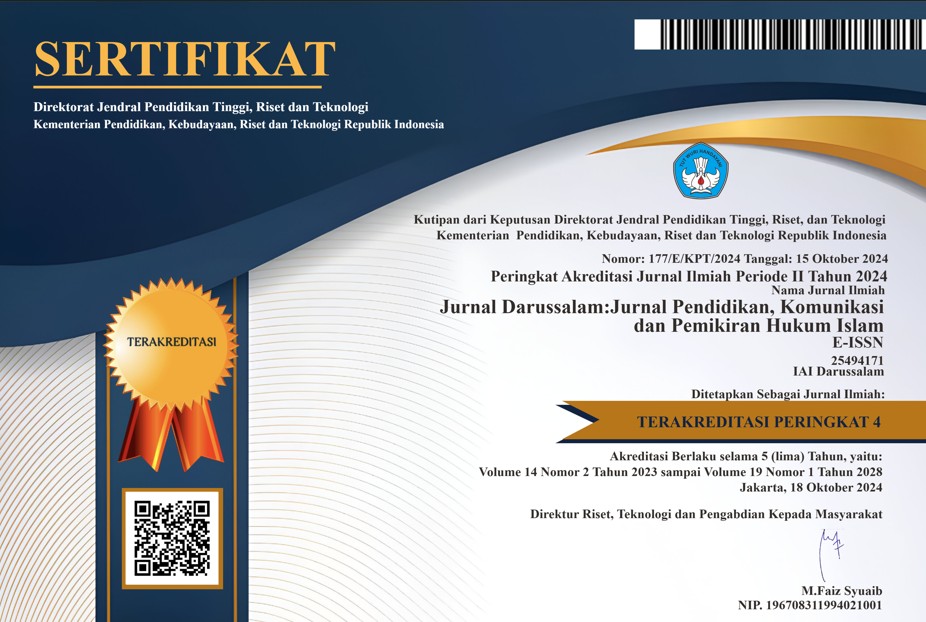Forging Resilient Characters: SD Plus Darul Ulum's Holistic Approach to Education in a Globalized World
DOI:
https://doi.org/10.30739/darussalam.v15i2.2915Keywords:
Character Education, Globalization, Holistic Learning, Experiential LearningAbstract
This research explores the character-building programs at SD Plus Darul Ulum, Jombang, focusing on how they cultivate resilience and toughness in students. The study delves into distinctive programs, including the Pioneering International Primary School, "Everyday with Al-Qur’an," Full Day School, and Outdoor Learning initiatives. Theoretical frameworks encompass globalization of education, holistic learning, extended learning time, and experiential learning. Qualitative methods involve interviews, focus group discussions, observations, and document analysis. Findings reveal the alignment of programs with global standards, holistic Islamic education, extended learning principles, and a comprehensive approach to student development. The research contributes to character education literature, addresses a gap in primary school research, and offers insights for educators and policymakers. It emphasizes the holistic nature of education, transcending traditional paradigms, and positions SD Plus Darul Ulum as a beacon for character development in the 21st century.
Downloads
References
Adolfsson, C. H., & Alvunger, D. 2020. Power dynamics and policy actions in the changing landscape of local school governance. Nordic Journal of Studies in Educational Policy, 6(2), 128-142.
Alam, A. 2020. What is the'Philosophy of Chemistry Education'? Viewing Philosophy behind Educational Ideas in Chemistry from John Dewey’s Lens: The Curriculum and the Entitlement to Knowledge. PalArch's Journal of Archaeology of Egypt/Egyptology, 17(9), 6857-6889.
Bellei, C., Morawietz, L., Valenzuela, J. P., & Vanni, X. 2020. Effective schools 10 years on: factors and processes enabling the sustainability of school effectiveness. School Effectiveness and School Improvement, 31(2), 266-288.
DeLuca, V., Miller, D., Pliatsikas, C., & Rothman, J. 2019. Brain adaptations and neurological indices of processing in adult second language acquisition: challenges for the critical period hypothesis. The handbook of the neuroscience of multilingualism, 170-196.
Dewald, J. 2016. Achieving longevity: How great firms prosper through entrepreneurial thinking. University of Toronto Press.
Dewey, J. 2022. The collected works of John Dewey. DigiCat.
Evans, R., & Saracho, O. N. (Eds.). 2022. The Influence of Theorists and Pioneers on Early Childhood Education. Routledge.
Fullan, M. 2007. Leading in a culture of change. John Wiley & Sons.
Kidron, Y., & Lindsay, J. 2014. The Effects of Increased Learning Time on Student Academic and Nonacademic Outcomes: Findings from a Meta-Analytic Review. REL 2014-015. Regional Educational Laboratory Appalachia.
Kolb, A., & Kolb, D. 2018. Eight important things to know about the experiential learning cycle. Australian educational leader, 40(3), 8-14.
Kolb, D. A. 2014. Experiential learning: Experience as the source of learning and development. FT press.
Kreis, K. E. 2019. The exploration of multicultural pedagogy on rural student global literacy and college preparedness.
Nussbaum, M. 2014. Women and cultural universals. In Pluralism (pp. 197-227). Routledge.
Rizvi, F. 2015. Internationalization of curriculum: A critical perspective. The Sage handbook of research in international education, 337-350.
Sharkins, K., Newton, A., Causey, C., & Ernest, J. M. 2017. Flipping theory: Ways in which children’s experiences in the 21st century classroom can provide insight into the theories of Piaget and Vygotsky. Southeast Asia Early Childhood Journal, 6, 11-18.
Snarey, J. 2014. Faith development, moral development, and nontheistic Judaism: A construct validity study. In Handbook of moral behavior and development (pp. 301-328). Psychology Press.
Downloads
Published
Issue
Section
Citation Check
License
Copyright (c) 2024 Jurnal Darussalam: Jurnal Pendidikan, Komunikasi dan Pemikiran Hukum Islam

This work is licensed under a Creative Commons Attribution-ShareAlike 4.0 International License.
Semua artikel yang dipublikasikan dapat diakses secara umum melalui online dan bersifat bebas download
http://creativecommons.org/licenses/by-sa/4.0/
















